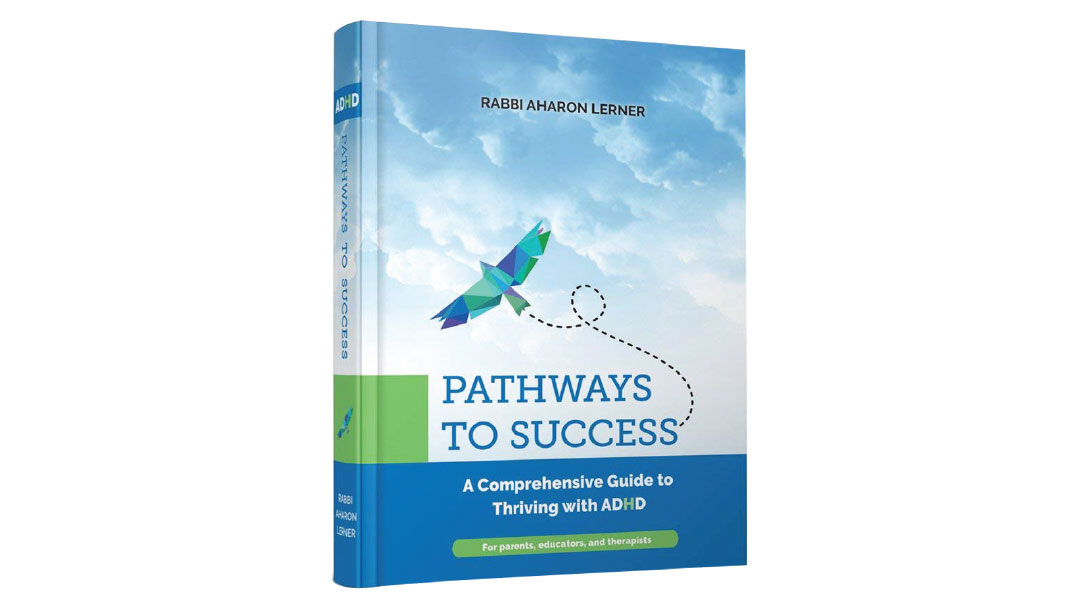Pathways to Success: A Comprehensive Guide to Thriving with ADHD
| November 18, 2020As a therapist, I encounter people with a lot of difficulties and challenges, and one way I unwind after a difficult appointment is by writing

Book: Pathways to Success: A Comprehensive Guide to Thriving with ADHD
Author: Rabbi Aharon Lerner
Publisher: Menucha Publishers
How it all began
Twenty years ago, at the instruction of the Belzer Rebbe, I studied methods to improve cognitive functioning under Professor Reuven Feuerstein a”h, and began to work with children who had learning disabilities.
After six years in this field, I qualified in psychotherapy, because I wanted to be able to treat emotional difficulties, too. Through my psychotherapy work with adults, I realized there were a jumble of emotional issues that often accompanied ADHD. What’s sad is that ADHD doesn’t have to involve these complications. They’re mostly a result of ignorance about how to educate and relate to a child with ADHD; a lot of anguish could be prevented if parents, teachers, and the public were more aware of the nature of the disorder. With that understanding, ADHD children would receive what they need to thrive.
Could you describe your writing space?
I live in Beit Shemesh and work from my office there half a week. During the other half of the week, I work in Yerushalayim. I devote one entire day, Tuesday, to researching and writing articles and preparing lectures. Most of the work on this book happened on those Tuesdays, and it was typed up on my laptop while sitting on buses on the way to Yerushalayim.
As a therapist, I encounter people with a lot of difficulties and challenges, and one way I unwind after a difficult appointment is by writing.
What I left unwritten
I left out the clinical descriptions of the symptoms, the “dry rules.” When I went to my Rebbe, the Admor of Belz shlita, to get guidance for my book, he told me not to use professional terms but simple language, to make it accessible to parents, to laymen with no psychological knowledge, and even to children with ADHD.
The hardest part to write
Like an anthropologist who travels to live with a tribe to learn about their culture, I had to journey into the world of children and adults with ADHD. As a therapist, I’m trained to enter other people’s realities and understand them, but it’s still a challenge.
The book in six words
“You win him, you lose him.” If you force an ADHD child to do something against his nature, such as doing a chore when he’s in the middle of something he enjoys, or sitting silently for a long time, you may have won the battle by force, but you’ve lost the child. There are still some who feel, “We have to teach this kid how to behave, we have to get him into shape,” but this won’t work.
I can’t forget the call I got from a chassidish mother who asked me to meet with her son. She warned me that he was no longer frum and was in a bad place. When he came, a teen with earrings and a ponytail, we spoke about what he was going through and I did an assessment.
It emerged that he had a classic case of ADHD, which had gone undiagnosed. All the years, his challenging behavior was misunderstood, and he’d felt crushed and worthless. He was actually smart and talented — his weaknesses stemmed from his ADHD. The suffering he experienced because he was misunderstood and mistreated had led him to run away from his whole world, and almost from life itself.
Not to be confused
It’s crucial that mechanchim, teachers, and parents don’t diagnose ADHD on their own, but go to a trained, licensed specialist. Even if all classic symptoms are present and you have decades of experience working with children, there are many issues that can present with similar symptoms, but require completely different treatment.
I’ve seen bystanders sure that a child who is nervous and impulsive has ADHD, when in fact the root issue was trauma from emotional abuse. Emotional issues can cause a lot of similar symptoms, but obviously ADHD medications won’t work to treat them. You need a thorough evaluation by a professional.
What readers will walk away with
A person has to understand himself and understand the children under his care. Trying to educate a child with ADHD without understanding how his brain works is like using a complex appliance without reading the manual. Hopefully, my book can serve as this vital manual, motivating and helping parents and spreading awareness in the community about ADHD. After all, our children depend on us to provide the framework for them to thrive.
Memorable Client
I once met up with parents and their ten-year-old son. The child had all the symptoms of ADHD, they said. He’d been taking medication for two years, prescribed by a doctor who based his diagnosis mainly on the observations of the child’s rebbi. He couldn’t learn, acted impulsively, and had social issues. The cheder had recently informed the parents that unless his behavior improved, he’d have to leave. The strange thing was that there was no improvement in his symptoms when he used ADHD medication.
I asked to look at previous assessments, but there weren’t any. The rebbi who had initially noted the ADHD symptoms was experienced and highly regarded, and the devoted parents had followed his advice. They’d given the child a lot of private tutoring, but nothing helped.
When I sat down with the child alone, he was talkative, full of complaints about his friends. I, too, noted the classic ADHD-type symptoms. Yet my experience and my instincts told me something was off. He was tense and didn’t seem emotionally secure.
We spoke about his learning difficulties, and I went back through his grades in cheder to discover when they’d started. The boy told me he’d been fine until two grades ago.
I asked him what had happened to him two years ago.
He was quiet.
I waited.
Then he started to cry, and after a while, said, “Something happened to me, but I’m embarrassed to say.”
With time, and the creation of a safe space, the child’s story emerged. It was a serious one-time incident of molestation. The effect of the event, and the shame and guilt the child carried, caused a drastic change in his behavior and personality. It led to a misdiagnosis, because practitioners didn’t take into account his history and didn’t look for a reason for this sudden change.
I sent this boy to another professional for a second evaluation and opinion, and he concurred this wasn’t a case of ADHD. The child received the therapy he needed, and his school life slowly turned around.
Throwback
You might remember the Lifelines story a couple of months ago about a psychotherapist who helped his young son and classmates deal with the tragic passing of their friend by holding a simulated levayah. That was me.
(Originally featured in Family First, Issue 718)
Oops! We could not locate your form.













